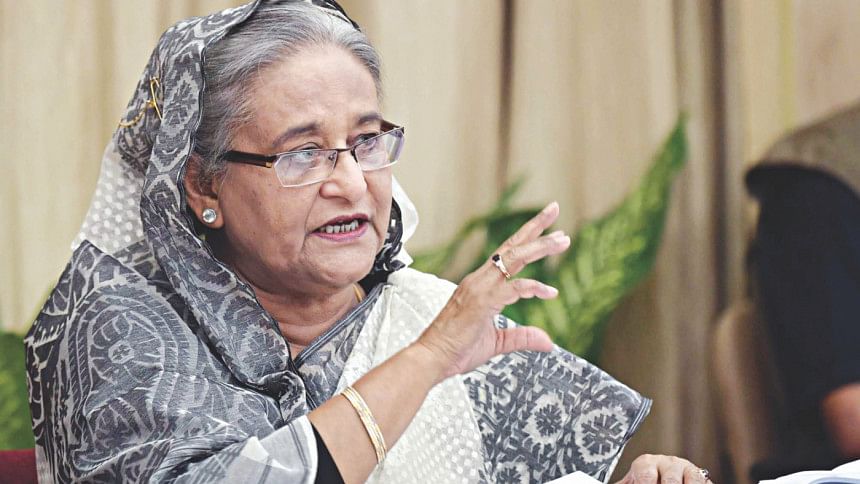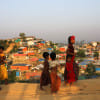Rohingyas threat to national, regional security: PM

Prime Minister Sheikh Hasina today said the 1.1 million Rohingyas, who fled to Bangladesh from Myanmar in the face of persecution, are not only a threat to the security for Bangladesh but also the region.
"I urge the world community to take appropriate action realising the gravity of the threat," she said while inaugurating the three-day Dhaka Global Dialogue.
Bangladesh Institute of International and Strategic Studies (BIISS), a Government think-tank, and India's Observer Research Foundation (ORF) jointly organised the dialogue at Hotel InterContinental in the city.
'Growth, development and Indo-Pacific' is the theme of the dialogue where over 150 international participants are taking part for keynote presentations, panel discussions, speed talks and live casts.
Foreign Minister AK Abdul Momen and ORF President Samir Saran also spoke at the programme. BIISS Director General AKM Abdur Rahman delivered the welcome speech.
The prime minister said the current century is being considered as the 'Century of Asia' in terms of socio-economic development and prosperity, adding: "I think that peace and harmony must be maintained for the prosperity of the region."
Sheikh Hasina said poverty is the common enemy of the countries of this region. "Therefore, the main goal of all our activities should be directed to eradicate people's poverty and ensure their comfortable lives with economic development."
She said Bangladesh is geographically a country ashore of the Bay of Bengal and as such of the Indian Ocean. "This ocean has huge significance for various reasons. Indian Ocean consists of a number of vital maritime routes, which contribute significantly to the largest economies of Asia."
The premier said half of the global container shipment and 80 percent of global fuel trade pass through the Indian Ocean. And 16.8 percent of the global reserve of oil and 27.9 percent of natural gas is situated in this ocean. Twenty-eight percent of the total fisheries are collected from Indian Ocean.
"Indian Ocean, being the source of immense resources and the part of strategically important seaways, is thus considered very important," Hasina said.
In the area of maritime boundary and maritime economy, Bangladesh believes that strong competition among each other or 'zero-sum game' will not be helpful in flourishing the 'Blue Economy' of the Bay of Bengal or the Indian Ocean, rather would act as a stumbling block in ensuring security and stability of this region, the prime minister said.
"I also think that in order to extract maritime resources sustainably as well as for the durable development of the 'Blue Economy', the relations between coastal countries need to be cooperative, amicable, dignified and equitable," she said.
Hasina said Bangladesh is always active to enhance peaceful and cooperative relations in the region of the Bay of Bengal and the Indian Ocean. "Bangladesh has resolved its maritime boundary disputes in a peaceful manner with its neighbours India and Myanmar. I think this can be an example for the world. Such cooperative approach and efforts by us in resolving crises can be a lesson for other regions."
She said if there are neighbours, there will be some problems that can be resolved through discussions and friendly relations, not by quarrelling.
The prime minister said different threats like piracy, armed robbery, and terrorist attacks in coastal and maritime areas, human trafficking, arms and drug smuggling, are existent in Indian Ocean and Bay of Bengal region. These unconventional risks are needed to be addressed collectively by everyone.
"Excessive extraction of resources, including fisheries, as well as various pollutions is jeopardising the maritime environment," she said.
Hasina noted that pollution and excessive extraction of marine resources are destroying the ecologies in the sea, damaging the overall environment of the world. "As a result, threats are being created for human health and livelihood. But I believe that it is not possible for a single country to resolve these crises. In order to resolve all these problems, I call upon all concerned countries to strengthen bilateral and multilateral cooperation as well as partnerships."
She said Bangladesh believes that such cooperation is needed to be inclusive for all and with the aim of everyone's development and security.
Hasina said there are a total of 40 developing countries surrounding the Indian Ocean, where 35 percent of the global population lives. There are six countries surrounding the Bay of Bengal, and few more countries like Nepal, Bhutan, the Maldives, Malaysia and Singapore have important impact of the Bay on their economies despite not being at the coast.
"The economies of the countries ashore of or dependent on the Indian Ocean and the Bay of Bengal, and the lives of their people are hugely influenced by the ocean and the sea. The resources, environment, ecology and security of the ocean and the sea directly affect the economy and the security of these nations."
Therefore, she said, peace and stability in the Indian Ocean and the Bay of Bengal is essential for the economic progress and security of these countries.
The prime minister said as an offshore country, the sea plays an extremely important role in Bangladesh's economy, and for many reasons Bangladesh puts high priority on the Indian Ocean as well as on Bay of Bengal.
Firstly, she said, 90 percent of total external trade of Bangladesh is conducted through maritime routes. The security and stability of these maritime routes is very important for the economic stability of Bangladesh.
Secondly, the PM said, Bangladesh's absolute sovereignty has been established over an area of 1,18,813 square kms in the Bay after the reconciliation of maritime boundaries with Myanmar in 2012 and with India in 2014.
"These huge maritime areas, including 200 nautical miles, can be a source of huge resources for Bangladesh. The utilisation of these resources for the economic development of the country largely depends on the stability of this region," she said.
Thirdly, Hasina said, the Bay of Bengal and Indian Ocean contain huge fisheries as well as mineral and other resources apart from natural gas. Through proper sustainable planning and with collective and sincere efforts, these resources can be utilised for the sustainable development of the countries of this region.
"A study shows that the tentative amount of resources that can be collected from the maritime area of Bangladesh is almost equal to the tentative amount of resources Bangladesh produces on its land," the premier said.

 For all latest news, follow The Daily Star's Google News channel.
For all latest news, follow The Daily Star's Google News channel. 








Comments